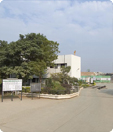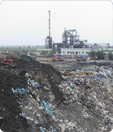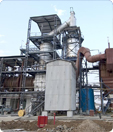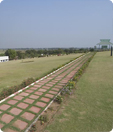Solid Waste Management
 |
Solid waste can broadly be classified into two categories. According to Indian MSW, Rules 2000 "Municipal Solid Waste" includes commercial and domestic wastes generated in a municipal or notified area in either solid or semi-solid form excluding industrial hazardous wastes but including treated bio-medical wastes. Solid waste also includes hazardous waste generated by various industries. Municipal Solid Waste (MSW) can further be classified into biodegradable waste (such as food and kitchen waste); recyclable materials (such as paper, glass, bottles, metals and certain plastics) and domestic hazardous waste (such as medication, chemicals, light bulbs and batteries). Solid waste management is one of the major challenges faced by many countries around the globe. Inadequate collection, recycling or treatment and uncontrolled disposal of waste in dumps can lead to severe hazards, such as health risks and environmental pollution. The management of solid waste typically involves its collection, transport, processing and recycling or disposal. Collection includes the gathering of solid waste and recyclable materials, and the transport of these materials, after collection, to the location where the collection vehicle is emptied. This location may be a material processing facility, a transfer station or a landfill disposal site. Waste disposal today is done primarily by land filling or closure of existing dump sites. Modern sanitary landfills are not dumps; they are engineered facilities used for disposing of solid wastes on land without creating hazards to public health or safety, such as the breeding of insects and the contamination of ground water. |
 |
The Ministry of Urban Development, in its manual on solid waste management (year 2000) has estimated country wide waste generation of 100,000 MT per day. Where does this tremendous amount of waste go? In India the segregation of waste is almost negligible. Municipal Solid Waste is dumped in a mixed form in an unscientific manner on open waste land or low lying areas even near creeks, forests, rivers, ponds and other ecological sensitive regions. This practice is commonly known as ‘Open dumping’/haphazard dumping and does not meet the norms of disposal specified in the MSW Rules. These dumping grounds not only affect the environment by air, water and soil pollution but also damage the property in the vicinity. The presence of moisture and rainwater leach the pollutant chemicals produced during degradation to dissolve and flow into the groundwater reserve/sea/river thereby affecting the flora and fauna of the water body. The dump sites virtually become a breeding ground for all kinds of diseases. Besides this, it leads to formation of secondary pollutants like Hydrogen sulfide, methanethiol and other Hydro sulfurous gaseous pollutants reacting with bacteria present in the waste in the presence of moisture and temperature. Methane, which is one of such toxic gases produced, leads to fire hazards. Dumped hazardous and biomedical chemicals also leak into waterways and aquifers, which pollute water and soils. Even dumped yard debris harms the environment. In metropolitan cities where the land cost is on high rise, by filling such mixed garbage in the low lying area near the creek and bringing it to a ground level helps the builders to construct the buildings for both residential and commercial houses and ignoring the adverse impact of garbage reaction underneath. |
 |
|
 |
Landfill Closure of Gorai Dumping Ground, Mumbai.
This project was awarded by the MCGM. The dumpsite is located in a western suburb of Mumbai, and is spread over an area of 19.6 hectares. When MCGM awarded the project, the total quantity of Municipal Solid Waste (MSW) and C&D (Construction & Debris) waste stored at the site was estimated to be 2.34 million tons. The work done for the Gorai Project can be divided into two broad categories: (i) Work relating to the closure and capping of the Gorai dumpsite; and (ii) Work relating to the operation and maintenance of the capped dumpsite for a period of fifteen years. Integrated Waste Management Project at Coimbatore.
This PPP project is a BOOT basis project for a period of 20 years and has been approved under Jawaharlal Nehru Urban Renewal Mission (JNNURM) scheme of the Govt. of India. Tatva has done development, design, engineering, finance, construction, implementation, operation and maintenance of: transfer stations, transportation of Municipal Solid Waste (MSW) from transfer station to waste processing & disposal site, closure of existing dumpsites, and processing & disposal facility of treating 400 tons of waste generated from Coimbatore in the State of Tamil Nadu. For the Coimbatore projects waste dumpsites have been created at:
City Industrial Development Corporation (CIDCO), New Mumbai
Tatva has executed the project of development, maintenance & operation of waste processing for a period of 3 years for CIDCO, at Chal near Taloja MIDC, as per MSW Rules 2000 on a BOOT Basis. Tatva has utilized the Windrow Technology for Composting. The capacity of the compost plant is 55 MT per day & for the landfill is 15.5 years with a total area of 14 hectares. National Building Construction Corporation Limited (NBCC), New Delhi
Tatva is executing a project for providing, testing, and commissioning of 100 TPD Municipal Solid Waste (MSW) compost plant and Vermi composting in Jodhpur, Rajasthan on BOOT basis. With a total area of 48 acres to work with, Tatva will be using Windrow Technology and Vermiculture for the project. The project will include providing all mechanical, electrical, hydraulic accessories etc., including 5 years of operation & maintenance. Deonar Municipal solid waste Project at Deonar, Mumbai.
The project was awarded to a consortium, which formed a Special purpose vehicle (SPV) by the name of "Tatva Global Environment (Deonar) Limited" to execute this Integrated Waste Management facility in Deonar, Mumbai. The existing landfill at Deonar covers a total of 132 hectares, of which approximately 120 hectares have been used for waste disposal. The overall management plan for site has the following components: Tatva's activities in Deonar consist of
|
 |
Hazardous Waste Management at Ankleshwar
Tatva’s subsidiary Bharuch Enviro Infrastructure Ltd (BEIL) operates a landfill facility at Ankleshwar. This facility has been in operation since 1998 and is India’s first such facility to be certified under ISO 140001. Over the years this facility has handled over 1,003,732 MT of solid and hazardous waste. This project houses a special Hazardous Waste Incineration Facility with a capacity of 6.5 Million KCal/ Hour. The collection, processing and disposal of hazardous waste takes place here. Total waste incinerated is 47,277 MT. Common Hazardous Waste Treatment, Storage and Disposal Facility, Majra, Himachal Pradesh
Tatva has taken up this project for the waste generated by the Baddi, Barotiwala, Nalagarh Industries Association (BBNIA) in Himachal Pradesh. The land area available for setting up this facility is approx 22 hectares with a storage capacity of 10,00,000 MT hazardous waste for a period of 20 years. The project has been conceptually designed for a secure Hazardous Waste Treatment, Storage and Disposal Facility (HWTSDF) at Village Majra for safe disposal of hazardous wastes generated by the approximate 503 Industries belonging to the textile, steel & pharmaceutical industries in Himachal Pradesh. The project work includes receiving and transportation of hazardous waste; inspection of hazardous waste, carrying out segregation, recovery, treatment, storage and disposal of hazardous waste residues including incineration, public information/ display of information , undertaking closure and post closure measures upon exhaustion of the site capacity; and collection, treatment and disposal of leachate using appropriate technology & closure and post closure. Know MoreCommon Hazardous Waste Treatment, Storage and Disposal Facility at Kochi, Kerala
This Solid Waste Management project was awarded to Tatva by Kerala State Industrial Development Corporation (KSIDC). The Government of Kerala has appointed Tatva for design, finance, construction, operation & maintenance including the post closure maintenance of a Common Hazardous Waste Treatment, Storage and Disposal facility at Kochi, Kerala with a capacity of approx 10,00,000 MT for 20 years using the Double liner system. Total site area at Ambalamugal measures approximately 50 acres, located 15 kms away from the city. The hazardous wastes from 182 companies from different districts are taken out into this landfill site. Ernakulam and Kollam are the major hazardous waste generating districts.. Major construction, development & operation activities consist of establishing the facility, including storage shed for hazardous wastes, receiving & transportation of hazardous waste, inspection of hazardous waste; carrying out segregation, recovery, treatment, storage & disposal of hazardous waste residues including incineration, monitoring on-site including emergency preparedness; reporting to regulatory authorities as needed; public information/display of information; undertaking closure & post closure measures upon exhaustion of the site capacity; collection, treatment & disposal of leachate using appropriate technology and closure & post closure maintenance. Waste Management Project for Kanpur Nagar Nigam (KNN), Uttar Pradesh.
Tatva has executed Civil, Mechanical, Electrical and Instrumentation work for the Hazardous Waste Disposal Facility in Rooma for Kanpur Nagar Nigam, UP. This project is for the safe disposal of hazardous sludge containing chromium generated from 36 MLD Sewage Treatment Plant (STP) at Jajmau, Kanpur. The Scheme includes grading of site; weighing of chromium contained STP sludge at the entrance; solidification / stabilization of STP sludge by missing Fly Ash & Lime in the ratio of 2:1:2 (Fly Ash:Lime:Sludge); closures/ capping of landfill unit after filling with solidified sludge; disposal of solidified sludge in the secured landfill with single composting liner and leachate management system; construction, supply, erection and commissioning of various civil, electrical and mechanical units; operation of sludge solidification & disposal system covering all material & equipments required and construction of final closure / capping system for landfill unit at the end of its life. |
Water Supply Management
Throughout the developing world, the provision of water supply ...
Wastewater Management
Urban water supply and sanitation are important basic needs ...
Waste-to-Energy
Waste-to-energy or energy-from-waste is the process ...
